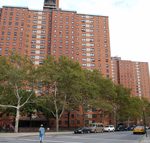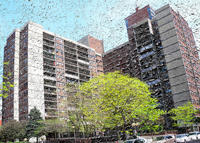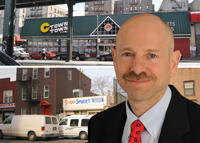New York Attorney General Letitia James is going after one of the largest multifamily landlords in the city for alleged lead-paint violations.
According to a complaint her office filed today, Chestnut Holdings repeatedly exposed children to lead paint and fraudulently certified that it had complied with the law passed to prevent that.
Bronx-based Chestnut, which has more than 6,000 units across 134 buildings, mostly in the Bronx, repeatedly failed to conduct annual inspections or remediate apartments where young children lived, even when it was asked to do so, according to court papers. The investigation was initiated in 2017, according to a source familiar with the matter.
Read more



The landlord also falsely certified in new leases that it had complied with the New York City Childhood Lead Poisoning Prevention Act, the complaint alleged.
“Exposure to lead paint in our aging housing stock puts children in grave jeopardy and our future at risk,” James said in a statement. “This highly toxic metal causes serious and irreversible harms, and I am committed to ensuring that landlords follow the laws to protect young children from lead poisoning.”
A spokesperson for Chestnut challenged the “quality of the investigation,” and said the firm complies with all lead laws “to the letter” and addresses lead issues immediately.
“Chestnut exceeds any reasonable standards in inspecting its units and trying to address all safety concerns, especially the presence of lead,” a spokesperson for the landlord said. “Chestnut’s strong safety record speaks to its commitment to all of its tenants, its communities, and its neighbors, but most especially children.”
According to the complaint, 600 children in Chestnut Holdings’ buildings are under the age of six and receive Supplemental Nutrition Assistance Program benefits, colloquially known as food stamps. Young children are more likely to be exposed to lead than any other age group. The rate of lead poisoning in New York City is highest in children of color and those who live in low-income areas.
Aaron Carr, whose tenant watchdog group Housing Rights Initiative is also suing Chestnut for deregulating apartments in buildings receiving tax benefits, said that James is proving to be the “most proactive attorney general combatting unlawful real estate practices.”
Lead-based paint was banned in 1960, but remediating the toxin has proved difficult in older buildings. In New York City it has been found in 43 percent of all dwellings. Having lead paint in an apartment is not necessarily illegal if there is no risk of exposure, but when building owners paint over it rather than remove it — which is expensive — it can eventually resurface. The health code thus requires lead paint to be enclosed with a rigid surface, such as drywall.
Revelations in 2018 that the New York City Housing Authority covered up exposure to lead — which can damage children’s brains — shocked the public and led to the appointment of a federal monitor.
Last month, Mayor Bill de Blasio signed into law four bills targeting landlords to strengthen enforcement of lead-paint rules.
A separate federal investigation of lead levels in private apartments that receive Section 8 benefits is ongoing.
